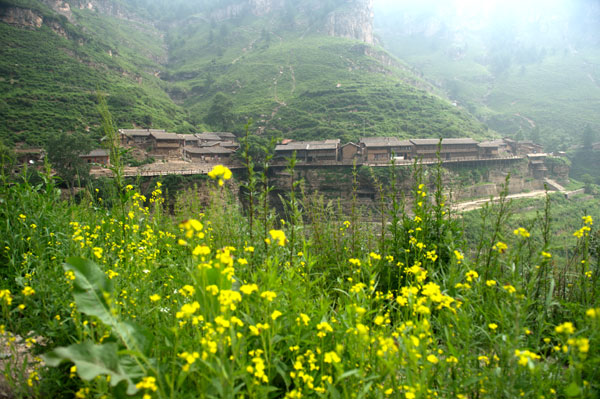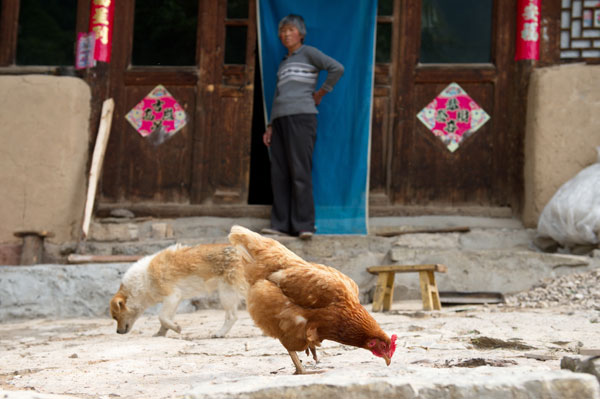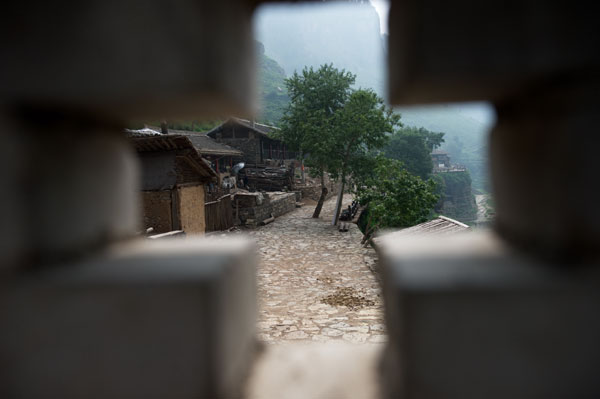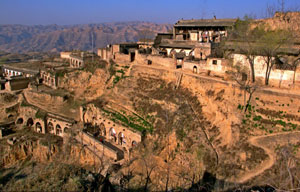Hope flickers in nearly deserted villages
There are a few villages scattered along the road within Mount Luya National Forest Park in Ningwu county, Shanxi province.
The settlements of flat houses typical in the region usually feature black-tiled roofs and a courtyard enclosed by walls or wooden fences — a beautiful sight indeed.
 |
|
"Hanging Village" is a secluded hamlet in Mount Luya National Forest Park.[Photos by Wei Xiaohao /China Daily] |
Spread on the sunny slopes, surrounded by forests and often with a river curving through, they are perfect gateways for travelers who are exploring the park.
But, many of the villages are deserted, with most of the houses locked, windows broken or roofs overgrown with weeds. From the looks of it, not many people are living in these valleys of the Guancen Mountains.
 |
|
Residents in "Hanging Village" are seniors, leading a simple life and often tending pigs and chickens. [Photos by Wei Xiaohao /China Daily] |
My local friend told me that's because traditional village schools, which were often short of teachers and facilities, have been dissolved in the past few years. These students are attracted to bigger and better primary schools in townships or county towns.
"As children left, so did their families," he says. "Now, except in the mushroom-picking season in the summer, you can hardly see young people in these villages."
It is true. Other than construction workers from Dongzhai township outside the park, we did not meet any young people even at "Hanging Village", a secluded ancient hamlet that has been developed into one of the major tourist attractions in the park.
The village, with about 20 families, sits on the top of a sheer precipice at an elevation of 2,300 meters above sea level. Flat houses with tiled roofs and traditional wooden structure stretch in a horizontal line on the cliff for more than 500 meters about 30 meters from the valley.

Leaning against the sunny slopes and overshadowed by the higher cliffs, the village looks as if it is hanging in the middle of a rock.
A well-paved stone path leads visitors from the bottom of the valley to the village entrance. The lane, zigzagging on the cliff, passes a water tank and a tiny mill with a millstone.
Ascending the stone steps through the entrance, you can reach the terrace in front of the houses that overlooks the valley embraced by lush coniferous forests. A river runs through the bottom of the valley. On the shady slope are orchards of various kinds of fruit trees, such as apple, pear and almond. Roses and wild flowers flourish at the periphery of the orchards.
The view is breathtaking, which can easily trigger a traveler's longing to sit down and have a cup of tea.
But such hospitality is still unavailable at the village. Maybe it is because the residents are all seniors, who lack the vision and ability to serve the visitors.
Tending several pigs and a flock of chickens remain the core activity for couple Bai Cunde and Wang Xiancun at the village.
They have nearly half a hectare of farmland on nearby slopes, on which they plant only yams.
"In the mountains, winter is long and cold, and you can't make a living just by farming," says Wang, the 59-year-old wife. "Besides, boars are common and often bully us (damaging the crop)."
Their son left for greener pastures in the cities, with his wife and children. At peak, there were 140 people living in the village, whose ancestors hid in the mountains to escape wars and natural disasters. Now there are only 30, Wang says.
Tourism hasn't slowed down the village's decline yet.
"Girls from the outside used to like moving to our village after marriages because harvests from forests and our farmland could make ends meet," Wang says.
"Now it's the opposite."
But things might change again. My friend and I spot a newly built guesthouse with a compound near the hamlet. Renovation is underway.
|
Zikou: one of China’s 100 most endangered cultural heritage sites |






















